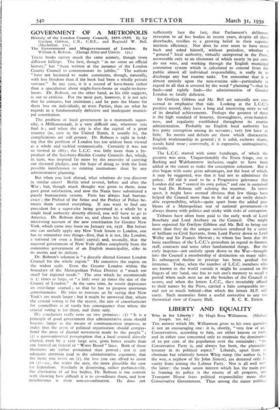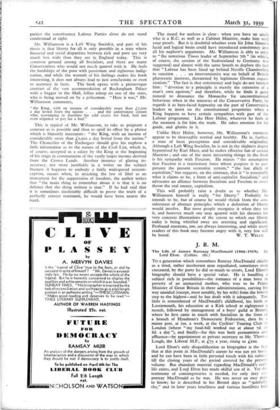LIBERTY AND EQUALITY
Who is for Liberty ? By Hugh Ross Williamson. (Michael Joseph. los. 6d.) THE answer which Mr. Williamson gives to his own question is not an encouraging one: it is, shortly, " very few of us." Conservatives, according to him, are either knaves or fools. and in either case concerned only to maintain the domination of 10 per cent. of the population over the remainder : "thc Conservative Party is, and always has been, the plutocrat'. tyranny in its political aspect." Liberals, apart from al, obstinate but relatively honest Whig rump (the author is, the way, a nephew of Sir John Simon), are deterred only b vanity from joining the Labour Party. Nor is all well wit! the latter: the trade union interest which has the main part in framing its policy is the enemy of all progress, ant: Transport House fears political responsibility more than Conservative Government. Thus among the major politicdi
parties the constituency Labour Parties alone do not stand condemned at sight.
Mr. Williamson is a Left Wing Socialist, and part of his thesis is that liberty for all is only possible in a state where financial and social disparities between rich and poor are very much less wide than they are in England today. This is common ground among all Socialists, and there are many Conservatives who would not much quarrel with it. He feels the hardships of the poor with passionate and righteous indig- nation, and while the warmth of his feelings makes his book interesting, it does not always lead to just conclusions or even to accuracy in facts. The book opens with a picturesque contrast of the vast accommodation of Buckingham Palace with a beggar in the Mall, fallen asleep on one of the seats, who is being moved on by a policeman. " Here it was," Mr. Williamson comments,
"the King, with an income of considerably more than k i,000 a day levied from the nation . . . and the unfortunate citizen who, scavenging in dustbins for odd crusts for food, had not even sixpence to pay for a bed."
This is typical of Mr. Williamson, to take as poignant a contrast as is possible and then to spoil its effect by a phrase which is blatantly inaccurate : " the King, with an income of considerably more than kr,000 a day levied from the nation."
The Chancellor of the Exchecluer should give his nephew a little information as to the nature of the Civil List, which is, of course, accepted as a salary by the King at the beginning of his reign in commutation of the vastly larger income derived from the Crown Lands. Another instance of glaring in- accuracy, not more justifiable in a writer on the subject because it happens to embody a fairly widespread miscon- ception, occurs when, in attacking the law of libel as an instrument for the suppression of freedom, the author writes that " the main thing to remember about it is that it is no defence that the thing written is true." If he had said that it is sometimes intolerably difficult to prove the truth of a perfectly correct statement, he would have been nearer the mark.
The moral for authors is clear : when you have an uncle who is a K.C. as well as a Cabinet Minister, make him read your proofs. But it is doubtful whether even Sir John Simon's lucid and logical brain could have introduced consistency into all his nephew's arguments. Mr. Williamson is able to refer to " ffie notorious Times leader of September 7th " (in which, of course, the cession of the Sudetenland to Germany was suggested) and almost with the same breath to deplore the fact that " Labour has been lined up behind Neville Chamberlain to sanction . . . an interventionist war on behalf of British plutocratic interests, threatened by legitimate Ferman expan- sionism." The fact is that consistency and logic do not interest him : " devotion to a principle is merely the extension of a man's own egotism," and therefore, while he finds it quite natural to denounce the Monarchy for unconstitutional behaviour when in the interests of the Conservative Party, he regards it as bare-faced hypocrisy on the part of Conservative leaders to insist on the constitutional proprieties when a King happens to have certain sympathies with part of the Labour programme. Like Herr Hitler, whatever he feels at the moment is for him the truth. He takes emotion for his guide, and glories in it.
Unlike Herr Hitler, however, Mr. Williamson's emotions appear to be thoroughly normal and healthy. He is, further, a man of keen perceptions and considerable originality. Although a Left Wing Socialist, he is not in the slightest degree hypnotised by Karl Marx, and he makes effective fun of certain Marxists ; and one of the most interesting things in the book is his sympathy with Fascism. He rejects " the assumption that Fascism is a reactionary force whose purpose is to per- petuate the present economic system," " the last ditch of capitalism," but suggests, on the contrary, that it " is essentially what it claims to be, a form of anti-capitalist Socialism," and advocates an alliance between Socialism and Fascism to over- throw the real enemy, capitalism.
This will probably raise a doubt as to whether Mr. Williamson himself is really " for liberty." Probably he intends to be, but of course he would shrink from the con- sideration of abstract principles which a definition of liberty would involve. But most people recognise it when they see it, and however much one may quarrel with his theories his very concrete illustrations of the extent to which our liberty today is being whittled away are arresting and significant. Profound emotions, too, are always interesting, and while many readers of this book may become angry with it, very few will



































































 Previous page
Previous page